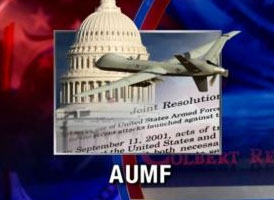A bipartisan group of House lawmakers have issued a letter Tuesday signaling that they intend to offer an alternative Authorization for the Use of Military Force (AUMF) to compete with a Senate proposal. They suggested a slightly more restrictive alternative.
 Rep. Mike Coffman (R-CO) authorized the letter, co-signed by Reps. Ruben Gallego (D-AZ), Don Bacon (R-NE), and Jimmy Panetta (D-CA). The same Congressmen offered a failed AUMF bill last year which would’ve ended the authorization in five years.
Rep. Mike Coffman (R-CO) authorized the letter, co-signed by Reps. Ruben Gallego (D-AZ), Don Bacon (R-NE), and Jimmy Panetta (D-CA). The same Congressmen offered a failed AUMF bill last year which would’ve ended the authorization in five years.
A specific expiration date would be different from the Senate’s version, which only counsels a review of the AUMF every four years. If Congress fails to review, or extend the AUMF, however, the Senate version doesn’t expire, making this a toothless provision.
Rep. Coffman also expressed that view, saying that it was a “dodge” and doesn’t force real debate. A new House version doesn’t appear to be written yet, but Coffman said it was 50-50 if it would be able to get through committee.
These AUMFs intend to replace the 2001 and 2002 AUMFs. The 2001 version started the global war on terror, and has been used as legal cover for all wars against all Sunni militants since then. The 2002 AUMF authorizes the US to invade Iraq at the president’s discretion.
The Senate’s version includes language intending to limit the wars to ISIS, al-Qaeda, and the Taliban, though whether it would be successful in doing so remains highly doubtful. Until we get more details on what this new House version looks like, it’s impossible to tell if it will be more explicit in those limitations.
The Trump Administration has expressed little interest in such proposals, and appears quite happy with the current lack of Congressional limitations on war-making. Expect such opposition to grow dramatically if an AUMF proposal with any teeth makes progress.
All AUMFs, both old and new, involve Congress continuing to act in accordance with the Constitution.
Article I, Section 8, Clause 11 of the U.S. Constitution grants Congress the power to declare war. The President, meanwhile, derives the power to direct the military after a Congressional declaration of war from Article II, Section 2, which names the President Commander-in-Chief of the armed forces. These provisions require cooperation between the President and Congress regarding military affairs, with Congress funding or declaring the operation and the President directing it. (Cornell Law School Legal Information Institute)


